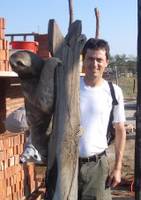Thanks to the strike, I didn’t get to Santa Cruz in time to rendezvous with all the other Habitat volunteers. They had flown in from Miami just before the strike and hired a van to San Julian two hours away. So, when I landed the next afternoon, I was grateful that the local Habitat affiliate sent a coordinator, Carmen, to greet me at the airport.
She found me filling out some lost luggage papers and trying my best to speak Spanish to Lissandro, the lost luggage go-to guy at the Santa Cruz airport. At first I thought he was fluent in English because he spoke such perfect grammar with barely any accent. “Your bags will be here, Mr. Troy. Please, do not worry. I am certain they will arrive tomorrow morning. Go to your hotel and have a comfortable night. Come back tomorrow, and your bag will be here. Everything will be OK.” It made me think of a valet offering pleasant accommodations to James Bond just before planting snakes in his suite. And when I pressed him on the details, like which flight the bag would be coming in on and if there were any way to use the bar code on my claim check to track the bag’s present location, it became clear that he was only performing lines well rehearsed for Americans. So I managed to dig deep for the Spanish phrases I needed, and despite Lissandro’s apparent unfamiliarity with the technological breakthrough we know as bar codes I got the answers I wanted to hear. Somehow Lissandro’s optimism was rubbing off on me. Images of my bag being eviscerated in the lost luggage office of the Mexico City airport began to fade.
On the cab ride to the hotel, Carmen was also optimistic. After a few days in Bolivia, I started to see this pattern in the people I met there. They deal with set-backs all the time, and they just seem to plow steadily ahead. Like on the plane, when the pilot announced our diversion to a different city. No one had reacted with more than a shrug. If that were to happen on an American domestic flight, some drunken passenger would scream out his demands to see Wilbur Wright immediately.
Carmen checked me into the hotel, courtesy of Habitat, and explained to the front desk that I would need an airport taxi first thing in the morning. It was now the hotel manager’s turn to be reassuring. “Oh, Mr. Troy, you will have no problems getting your luggage. It is being well cared for. In the morning you will have a nice breakfast, and your luggage will be waiting for you at the airport.”
My room was small but very comfortable, if a bit chilly with no heating system at all. What I didn’t yet know about Bolivian hotels is that if you want heat, the front desk will send up a space heater for a few extra bolivianos. I took a cold shower because I didn’t know how to work the electric water heater. Then I crawled into bed, but the thin blanket was not enough. So the front desk sent me a thicker one. I rolled myself burrito-style into the blankets and slept like a baby.
The next morning, I had a nice breakfast. The cab driver arrived as soon as I was ready. I found my bag and all its contents at the airport just like everyone said I would.

